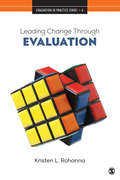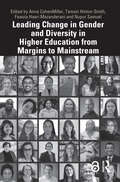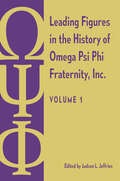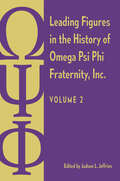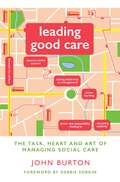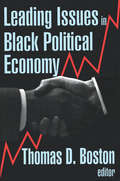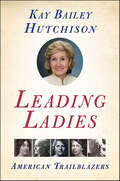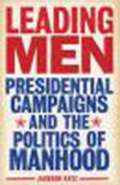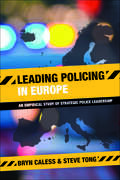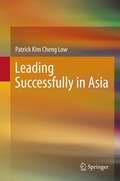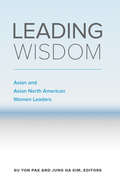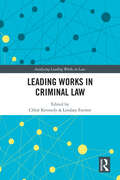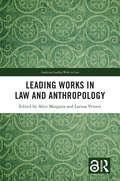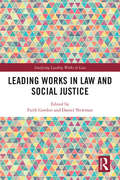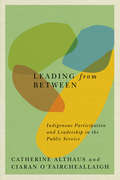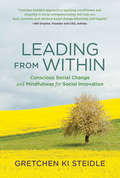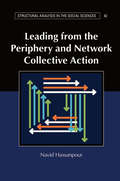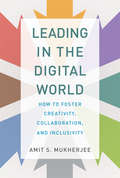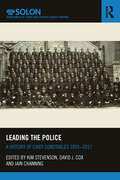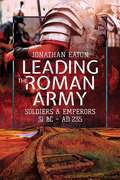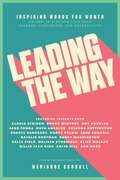- Table View
- List View
Leading Change Through Evaluation: Improvement Science in Action (Evaluation in Practice Series)
by Kristen L. RohannaEvaluators who are interested in developing or improving a program or policy frequently look to formative evaluation as a guiding framework.This book shows why those hoping to use evaluation to drive change in complex systems, rather than develop or improve one program, policy, or product, need to shift from the oversimplified idea of formative evaluation to a more specified continuous improvement model grounded in improvement science. In doing so, author Kristen L. Rohanna provides guidance to both evaluators and others, such as K-12 educators or hospital administrators, who lead improvement initiatives in their organizations and seek to solve persistent problems of practice. The book includes an extended case study: a networked improvement community of five public middle and high schools.
Leading Change Through Evaluation: Improvement Science in Action (Evaluation in Practice Series)
by Kristen L. RohannaEvaluators who are interested in developing or improving a program or policy frequently look to formative evaluation as a guiding framework.This book shows why those hoping to use evaluation to drive change in complex systems, rather than develop or improve one program, policy, or product, need to shift from the oversimplified idea of formative evaluation to a more specified continuous improvement model grounded in improvement science. In doing so, author Kristen L. Rohanna provides guidance to both evaluators and others, such as K-12 educators or hospital administrators, who lead improvement initiatives in their organizations and seek to solve persistent problems of practice. The book includes an extended case study: a networked improvement community of five public middle and high schools.
Leading Change in Gender and Diversity in Higher Education from Margins to Mainstream
by Tamsin Hinton-Smith Anna CohenMiller Fawzia Haeri Mazanderani Nupur SamuelThis edited book provides international insights and recommendations around topics of gender and diversity in higher education linking to larger societal goals of improving equality. Within each of the four sections – Student recruitment and retention, Student experience, Faculty and staff experiences and culture, and Higher education cultures of teaching and research – topics unpack and speak to gender and diversity, equity, inclusion and access, social justice, and leadership and sustainability in higher education institutions (HEIs). Incorporating innovative processes and methods, the researchers address how the experiences of groups who have been subordinated and marginalized can be heard, proposing a re-imagination of empowerment and leadership within higher education and best practices for the benefit of ongoing higher education development. This book is ideal reading for higher education leaders, students on higher education courses, leadership courses, gender in education, as well as researchers, practitioners, for topics of gender and diversity, equity, inclusion and access, social justice, leadership and sustainability in HEIs.
Leading Figures in the History of Omega Psi Phi Fraternity, Inc.: Volume 1
by Judson L. JeffriesHighlighting 21 members of this illustrious historically Black fraternity Omega Psi Phi Fraternity, Inc., was founded in 1911 at Howard University to cultivate and nurture a generation of leaders who would work toward racial uplift and influence American society. In an unprecedented two volumes, Judson Jeffries brings together original works on 21 of the fraternity’s accomplished and influential members. Written by a diverse group of scholars, these profiles highlight the national importance of these figures in their chosen fields of endeavor, as well as the enormous impact of this great fraternity. In volume 1, Jeffries presents a prologue and introduction that outline the story of the fraternity’s founding in the context of the racial, social, political, and educational history of the period. This volume spotlights scientists Ernest E. Just and Percy Lavon Julian; civil rights lawyers Fred Gray, Oliver Hill, Spottswood Robinson, and Oscar W. Adams Jr.; sports legends Robert Lee Elder and Clarence Gaines; and musicians Count Basie, Max Roach, and Roland Hayes.Including both widely recognized and little-known individuals and featuring people who were on the front lines of the struggle for racial equality and those whose work took place behind the scenes, these volumes show the contributions of Black leaders in the areas of science, civil rights, athletics, the arts, the military, politics, education, and more. Leading Figures in the History of Omega Psi Phi Fraternity, Inc. is a testament to the significance of Black Greek-letter organizations, whose members have made history through lives of struggle, accomplishment, triumph, and uplift. Contributors: Arthur Smith | Kevin C. McDonald | Marvin P. Dawkins | Theodore Walker, Jr. | Marvin Chiles | Waweise Schmidt | Bertis D. English | Judson L. Jeffries | Jomills Henry Braddock II | Matthew Buttermann | Christopher A. Brooks | Derryn Moten
Leading Figures in the History of Omega Psi Phi Fraternity, Inc.: Volume 2
by Judson L. JeffriesHighlighting 21 members of this illustrious historically Black fraternity Omega Psi Phi Fraternity, Inc., was founded in 1911 at Howard University to cultivate and nurture a generation of leaders who would work toward racial uplift and influence American society. In an unprecedented two volumes, Judson Jeffries brings together original works on 21 of the fraternity’s accomplished and influential members. Written by a diverse group of scholars, these profiles highlight the national importance of these figures in their chosen fields of endeavor as well as the enormous impact of this great fraternity. Volume 2 discusses Brigadier General Charles Young; artist and activist Charlotte "Lottie" Wilson, affectionately considered the fraternity's lone female member; modern civil rights activists T.R.M. Howard, Bayard Rustin, Lawrence Guyot, Jesse L. Jackson, and Emory O. Jackson; and scholars Lewis V. Baldwin, Asa Grant Hilliard III, and Benjamin E. Mays. Jeffries concludes by celebrating the recent rise in scholarship that draws attention to the fraternities and sororities that have connected other Black trailblazers such as these. Including both widely recognized and little-known individuals and featuring people who were on the front lines of the struggle for racial equality and those whose work took place behind the scenes, these volumes show the contributions of Black leaders in the areas of science, civil rights, athletics, the arts, the military, politics, education, and more. Leading Figures in the History of Omega Psi Phi Fraternity, Inc. is a testament to the significance of Black Greek-letter organizations, whose members have made history through lives of struggle, accomplishment, triumph, and uplift. Contributors: Judson L. Jeffries | Qiana M. Cutts | Francis V. Gourrier, Jr. | Dereck J. Rovaris | Kyle Brooks | Brian G. Shellum | Kimberly Mangun | Cynthia Hawkins | William J. Southerland | Raymond Sommerville | Jeaninne D. Wallace
Leading Good Care: The Task, Heart and Art of Managing Social Care
by John Burton Debbie SorkinTo lead good care, social care managers must have professional and personal authority: a clear understanding of the core task and the emotional challenges of care, and the imagination to create an organisation or team dedicated to meeting people's needs. This guide gives managers the understanding of systems of care and will inspire them to take the lead. Using the stories of four managers leading four different care services, John Burton explains the key issues and shows how, by focusing on the core task and taking the authority to lead, managers can transform social care. Furthermore, they will find their own work life-enhancing and immensely satisfying.
Leading Issues in Black Political Economy
by Thomas D. BostonLeading Issues in Black Political Economy brings together the foremost experts on issues ranging from employment, training, and education of African Americans. It also emphasizes macro-economic concerns of business development with special emphasis on long-term trends of black-owned businesses. The work emphasizes welfare considerations in an anti-welfare epoch, and the role of affirmative action now that it is under attack. Attention is given to the role of race in the continuing disparity of income distribution in American society. The highlights of Leading Issues include "An Employment and Business Strategy for the Next Century: A Comment," by Thomas D. Boston; "Long Term Trends and Prospects for Black-owned Business," by Andrew F. Brimmer; "Is the U.S. Small Business Administration a Racist Institution?" by Timothy Bates; "Worker Re-Training and Labor Market Outcomes: A New Focus for Labor Research," by James B. Stewart; "Race, Cognitive Skills, Psychological Capital, and Wages," by Arthur H. Goldsmith, William Darity, Jr., and Jonathan R. Veum; and "Reparations and Public Policy," by Richard F. America. The overall findings suggest that empirical wage equation specifications do matter. The role of psychological capital is critical in the marketplace. Race is indeed an important determinant of wages-especially when the influence of both cognitive skills and psychological capital are included in the wage equation. This volume will be of crucial interest to economists, political scientists, sociologists, and policy analysts studying African-American life. Thomas D. Boston is editor of the Review of Black Political Economy and professor of economics at the Georgia Institute of Technology. He is the co-editor, with Catherine L. Ross, of The Inner City: Urban Poverty and Economic Development in the Next Century, also available from Transaction.
Leading Ladies: American Trailblazers
by Kay Bailey HutchisonUnited States senator Kay Bailey Hutchison examines the lives of sixty-three pioneers in military service, journalism, public health, social reform, science, and politics—all American women.Following in the footsteps of her national bestseller, American Heroines, Senator Kay Bailey Hutchison celebrates female accomplishment in all walks of life. From the Nobel Prize to the halls of Congress, the trailblazers profiled in these skillfully drawn biographical portraits have battled tremendous odds to achieve success—if not always recognition—in their respective fields. Whether committed to a chosen cause or thrust into a public role by personal circumstance, these courageous women have all woven the thin threads of opportunity into sweeping tapestries of achievement.Mixing historical portraits with modern success stories, Senator Hutchison shows how American women from all periods of history have contributed to the strength and progress of our nation—and no history of the nation can be written without them.
Leading Men: Presidential Campaigns and the Politics of Manhood
by Jackson KatzWhy Americans always elect men as presidents?It's no secret that there is a wide-and growing-gender gap in American presidential politics. Over the past thirty years, Democrats have made major gains with women, while Republicans have been doing far better with men -especially white working class men.The question is why?In Leading Men, Jackson Katz argues that racial politics and economic anxieties are not enough to explain the dramatic gender divide in American voting patterns. Cutting against the grain of typical analyses of the gender gap that have focused almost exclusively on women, Katz trains his focus the other way around: on the male side of the equation. He offers stunning evidence that American presidential campaigns have evolved into nothing less than quadrennial referenda on competing versions of American manhood. And in the process, he never takes his eye off what this development means for women-as both candidates and citizens.Written in an engaging style that will appeal to general readers, political experts, and activists alike, Katz explores some of the major political developments, news events and campaign strategies that have made the presidency the center of a cultural conversation about manhood over the past few decades. Ranging from the election of the former Hollywood actor Ronald Reagan in 1980, through the election of Barack Obama in 2008, and into the 2012 campaign season, Katz zeroes in on how the very notion of what it means to be "presidential" has in many ways become synonymous with traditional definitions of manhood.Whether he is examining right-wing talk radio's relentless attacks on the masculinity of Democratic candidates, or how fears of appearing weak and vulnerable end up shaping candidates' actual policy positions, Katz offers a new way to understand the power of image in presidential politics. In the end, Leading Men offers nothing less than a paradigm-shifting way to understand the dynamics of presidential elections, and the very nature of the American presidency.
Leading Policing in Europe: An Empirical Study of Strategic Police Leadership
by Bryn Caless Steve TongLittle is known about those at the command end of policing in Europe. Over the last two years, Bryn Caless and Steve Tong have had unique access to those at the top of Europe's police forces, obtaining detailed comments from more than a hundred strategic police leaders in 22 countries and presenting, for the first time, information about how they are selected for high office, how they are held to account and what their views are on current and future challenges in policing. Building on research conducted in the UK, this is a timely and unparalleled insight into a little-known elite in the law-enforcement world.
Leading Successfully in Asia
by Patrick Kim LowThe book captures the essence of leadership, its characteristics and ways in Asia through the cultural and philosophical visor. With Asian sayings, proverbs and quotes, the book discusses leadership issues and ways in the major Asian countries including China, India, Indonesia, Japan, Malaysia and Singapore. The leadership styles and ways of various great Asian national leaders and corporate leaders in these Asian countries are also examined. Perhaps of much interest to scholars and students of leadership, certain unique Asian features such as Buddhism, Confucianism, Ta Mo, Chinese Animal zodiac signs, Hindu Gods, the Samurai, the Spirit of Bushido and Zen are examined in the light of leadership mastery and excellence. The book is also intended to be a practical book that gives numerous examples of a potpourri of leadership skills and ways a person needs to be a leader. It is very action-orientated, the reader is urged to think about it, reflect and act.
Leading Successfully in Asia
by Patrick Kim LowThe book captures the essence of leadership, its characteristics and ways in Asia through the cultural and philosophical visor. With Asian sayings, proverbs and quotes, the book discusses leadership issues and ways in the major Asian countries including China, India, Indonesia, Japan, Malaysia and Singapore. The leadership styles and ways of various great Asian national leaders and corporate leaders in these Asian countries are also examined. Perhaps of much interest to scholars and students of leadership, certain unique Asian features such as Buddhism, Confucianism, Ta Mo, Chinese Animal zodiac signs, Hindu Gods, the Samurai, the Spirit of Bushido and Zen are examined in the light of leadership mastery and excellence. The book is also intended to be a practical book that gives numerous examples of a potpourri of leadership skills and ways a person needs to be a leader. It is very action-orientated, the reader is urged to think about it, reflect and act.
Leading Wisdom: Asian And Asian North American Women Leaders
by Su Yon Pak Jung Ha KimDiscussions about leadership, even those centered on women, often overlook contributions made by Asian and Asian North American women. Now, Su Yon Pak and Jung Ha Kim share stories of Asian and Asian North American women who found their ways, sometimes circuitously, sometimes unexpectedly, into leadership roles. <P><P>Divided into three sections—“Remembering Wisdom,” Unsettling Wisdom,” and “Inciting Wisdom”—the book presents narratives of leadership experiences in the fields of social activism, parish ministry, teaching, U.S. Army chaplaincy, religious history, Christian denominational work, theology, nonprofit organization, theological social ethics, clinical spiritual care education in healthcare systems, and community organizing. <P><P>Leading Wisdom challenges conventional understanding through its creative reimagining of what it means to lead.
Leading Works in Criminal Law (Analysing Leading Works in Law)
by Lindsay Farmer Chloë KennedyThis book analyses a selection of leading works in the criminal law to ask questions about how the modern discipline of criminal law has developed, how it has been deployed in colonial and post-colonial contexts, and how criminal law scholarship has engaged with traditionally marginalised perspectives such as feminism, queer theory, and anti-carceral and abolitionist movements. The works analysed range from Macaulay’s Indian Penal Code (1837) to more recent textbooks and monographs on criminal law, and their jurisdictional reach extends to India, Canada, Australia, Malawi, the UK and the USA. The contributing authors include scholars, activists and legal practitioners, each of whom explores the intellectual development and geographical reach of ‘Anglo’-criminal law via the work they analyse. Across the collection, the editors and contributors address the question of what it means to be a leading work in criminal law. It will be a valuable resource for students, academics and researchers working in the area of Criminal Law.
Leading Works in Law and Anthropology (Analysing Leading Works in Law)
by Edited by Alice Margaria and Larissa VettersThe academic disciplines of law and sociocultural anthropology have a long but at times contentious history of drawing on each other in order to study and understand law and human experience in its diverse manifestations. This volume provides an innovative and engaging format by giving established and emerging scholars from diverse jurisdictions the opportunity to discuss and reflect upon what they consider to be a ‘leading work’. The collection offers a unique, multi-perspectival reconsideration of the intellectual history of the field whilst also addressing issues that are at the core of interdisciplinary legal research. Contributions shed light on the changing nature of cross-disciplinary research and collaboration, trace how disciplinary understandings of normativity have cross-fertilised each other, and reflect on choices taken within research on law and anthropology along a continuum of theoretical reflection, critique, engagement, and practical application. The book elaborates on the nature and the boundaries of law and anthropology research, as well as on its likely future development in light of the insights shared by contributors on their chosen leading works. The book will make fascinating reading for researchers and academics in both law and anthropology.Chapter 1 of this book is freely available as a downloadable Open Access PDF at http://www.taylorfrancis.com under a Creative Commons Attribution-Non Commercial-No Derivatives (CC-BY-NC-ND) 4.0 license.
Leading Works in Law and Social Justice (Analysing Leading Works in Law)
by Faith Gordon and Daniel NewmanThis book assesses the role of social justice in legal scholarship and its potential future development by focusing upon the ‘leading works’ of the discipline. The rise of socio-legal studies over recent decades has led to a more interdisciplinary approach to the study of law, which prioritises placing law into its wider social context. Recognising the role that culture, economics and politics play in the development of law is important in order to fully understand the position and impact of law in society. Innovative and written in an engaging way, this collection includes leading and emerging scholars from across the world. Each contributor has been invited to select and analyse a ‘leading work’, a publication which has for them shed light on the way that law and social justice are interlinked and has influenced their own understanding, scholarship, advocacy, and, in some instances, activism. The book also includes a specially written foreword and afterword, which critically reflect upon the contributions of the 'leading works' to consider the role that social justice has played in law and legal education and the likely future path for social justice in legal scholarship. This book will be an essential resource for all those working in the areas of social justice, socio-legal studies and legal philosophy. It will be of wider interest to the social sciences more generally.
Leading from Between: Indigenous Participation and Leadership in the Public Service (McGill-Queen's Indigenous and Northern Studies)
by Ciaran O'Faircheallaigh Catherine AlthausSince the 1970s governments in Canada and Australia have introduced policies designed to recruit Indigenous people into public services. Today, there are thousands of Indigenous public servants in these countries, and hundreds in senior roles. Their presence raises numerous questions: How do Indigenous people experience public-sector employment? What perspectives do they bring to it? And how does Indigenous leadership enhance public policy making? A comparative study of Indigenous public servants in British Columbia and Queensland, Leading from Between addresses critical concerns about leadership, difference, and public service. Centring the voices, personal experiences, and understandings of Indigenous public servants, this book uses their stories and testimony to explore how Indigenous participation and leadership change the way policies are made. Articulating a new understanding of leadership and what it could mean in contemporary public service, Catherine Althaus and Ciaran O'Faircheallaigh challenge the public service sector to work towards a more personalized and responsive bureaucracy. At a time when Canada and Australia seek to advance reconciliation and self-determination agendas, Leading from Between shows how public servants who straddle the worlds of Western bureaucracy and Indigenous communities are key to helping governments meet the opportunities and challenges of growing diversity.
Leading from Between: Indigenous Participation and Leadership in the Public Service (McGill-Queen's Native and Northern Series #94)
by Ciaran O'Faircheallaigh Catherine AlthausSince the 1970s governments in Canada and Australia have introduced policies designed to recruit Indigenous people into public services. Today, there are thousands of Indigenous public servants in these countries, and hundreds in senior roles. Their presence raises numerous questions: How do Indigenous people experience public-sector employment? What perspectives do they bring to it? And how does Indigenous leadership enhance public policy making? A comparative study of Indigenous public servants in British Columbia and Queensland, Leading from Between addresses critical concerns about leadership, difference, and public service. Centring the voices, personal experiences, and understandings of Indigenous public servants, this book uses their stories and testimony to explore how Indigenous participation and leadership change the way policies are made. Articulating a new understanding of leadership and what it could mean in contemporary public service, Catherine Althaus and Ciaran O'Faircheallaigh challenge the public service sector to work towards a more personalized and responsive bureaucracy. At a time when Canada and Australia seek to advance reconciliation and self-determination agendas, Leading from Between shows how public servants who straddle the worlds of Western bureaucracy and Indigenous communities are key to helping governments meet the opportunities and challenges of growing diversity.
Leading from Within: Conscious Social Change and Mindfulness for Social Innovation (The\mit Press Ser.)
by Gretchen Ki SteidleA roadmap for integrating mindfulness into every aspect of social change: how to lead transformation with compassion for the needs and perspectives of all people.Gretchen Steidle knows first-hand the personal transformation that mindfulness practice can bring. But she doesn't believe that transformation stops at personal wellbeing. In Leading from Within, Steidle describes the ways that personal investment in self-awareness shapes leaders who are able to inspire change in others, build stronger relationships, and design innovative and more sustainable solutions. Steidle argues that both personal and societal transformation are essential for a just society, and with this book she offers a roadmap for integrating mindfulness into every aspect of social change. Conventional methods attempt to compel people to change through incentives or punitive measures. Conscious social change calls for leading with a deeper human understanding of change and compassion for the needs and perspectives of all stakeholders.Steidle offers mindfulness practices for individuals and groups, presents the neuroscientific evidence for its benefits, and argues for its relevance to social change. She describes five capacities of conscious social change, devoting a chapter to each. She writes about her own experiences, including her work helping women to found their own grassroots social ventures in post-conflict Africa. She describes the success of a group of rural, uneducated women in Rwanda, for example, who now provide 9,000 villagers with clean water, ending the sexual exploitation of disabled women unable to collect water on their own. Steidle also draws from the work of change agents in the United States to showcase applications of conscious social change to timely issues like immigration, racism, policing, and urban violence. Through personal stories and practical guidance, Steidle delivers both the inspiration and tools of this innovative approach to social transformation.About Global Grassroots: In post-conflict Africa, Global Grassroots equips emerging women leaders, including war survivors, subsistence farmers, and the undereducated, with the tools and resources to create conscious social change. Our core program is our Academy for Conscious Change, a social entrepreneurship and mindfulness-based leadership program that helps vulnerable women design their own non-profit solutions to address priority social issues. In our first decade of operations we have trained over 650 change agents who have designed 150 civil society organizations benefiting over 150,000 people.
Leading from the Periphery and Network Collective Action
by Navid HassanpourPolitical revolutions, economic meltdowns, mass ideological conversions and collective innovation adoptions occur often, but when they do happen, they tend to be the least expected. Based on the paradigm of 'leading from the periphery', this groundbreaking analysis offers an explanation for such spontaneity and apparent lack of leadership in contentious collective action. Contrary to existing theories, the author argues that network effects in collective action originating from marginal leaders can benefit from a total lack of communication. Such network effects persist in isolated islands of contention instead of overarching action cascades, and are shown to escalate in globally dispersed, but locally concentrated networks of contention. This is a trait that can empower marginal leaders and set forth social dynamics distinct from those originating in the limelight. Leading from the Periphery and Network Collective Action provides evidence from two Middle Eastern uprisings, as well as behavioral experiments of collective risk-taking in social networks.
Leading in the Digital World: How to Foster Creativity, Collaboration, and Inclusivity (Management on the Cutting Edge)
by Amit S. MukherjeeThe definitive book on leadership in the digital era: why digital technologies call for leadership that emphasizes creativity, collaboration, and inclusivity.Certain ideas about business leadership are held to be timeless, and certain characteristics of leaders—often including a square jaw, a deep voice, and extroversion—are said to be universal. In Leading in the Digital World, Amit Mukherjee argues that since digital technologies are changing everything else, how could they not change leadership ideologies and styles? As more people worldwide participate equally in business, those assumptions of a leader's ideal profile have become irrelevant. Offering a radical rethinking of leadership, Mukherjee shows why digital technologies call for a new kind of leader—one who emphasizes creativity, collaboration, and inclusivity.Drawing on a global survey of 700 mid-tier to senior executives and interviews with C-level executives from around the world, Mukherjee explains how digital technologies are already reshaping organizations and work and what this means for leaders. For example, globally dispersed businesses can't reserve key leadership roles for people from exclusive groups; leadership must become inclusive, or fail. Leaders must learn to collaborate in a multipolar world of networked organizations, working with co-located and non-co-located colleagues. Leaders must lead for creativity rather than productivity. Focusing on practice, Mukherjee outlines goals and strategies, warns against unthinking assumptions, and explains how leaders can identify the mindsets, behaviors, and actions they need to pursue. With Leading in the Digital World, Mukherjee offers the definitive book on leadership for the digital era.
Leading the Police: A History of Chief Constables 1835–2017 (Routledge SOLON Explorations in Crime and Criminal Justice Histories)
by Kim Stevenson, David J. Cox and Iain ChanningIn 2015 the College of Policing published its Leadership Review with specific reference to the type of leadership required to ensure that the next generation of Chief Constables and their management approach will be fit for purpose. Three key issues were highlighted as underpinning the effective leadership and management of contemporary policing: hierarchy, culture and consistency. Yet these are not just relevant to modern policing, having appeared as constant features, implicitly and explicitly, since the creation of the first provincial constabularies in 1835.This collection reviews the history of the UK Chief Constable, reflecting on the shifts and continuities in police leadership style, practice and performance over the past 180 years, critiquing the factors affecting their operational management and how these impacted upon the organization and service delivery of their forces. The individuality of Chief Constables significantly impacts on how national and local strategies are implemented, shaping relationships with their respective communities and local authorities. Importantly, the book addresses not just the English experience but considers the role of Chief Constables in the whole of the United Kingdom, highlighting the extent to which they could exercise autonomous authority over their force and populace. The historical perspective adopted contextualises existing considerations of leadership in modern policing, and the extensive timeframe and geographical reach beyond the experience of the Metropolitan force enables a direct engagement with contemporary debates. It also offers a valuable addition to the existing literature contributing to the institutional memory of UK policing. The contributors represent a range of disciplines including history, law, criminology and leadership studies, and some also have practical policing experience.
Leading the Roman Army: Soldiers & Emperors, 31 BC–235 AD
by Jonathan EatonA historian and archeological scholar examines the complex relationship between Roman emperors and their armies.For the emperors of Ancient Rome, effective political management of the army was vital to the overall stability of the empire. In Leading the Roman Army, historian Jonathan Mark Eaton examines how emperors endeavored to control the military from the battle of Actium in 31 BC, to the demise of the Severan dynasty in AD 235.This study draws on the latest evidence from archaeological, epigraphic, literary and numismatic sources on the relationship between the emperor and his soldiers. It demonstrates that the emperor was not only the army’s commander-in-chief, but also their patron and benefactor, even after their discharge from military service.With forces dispersed along the frontiers of the empire, the emperor needed a strong military hierarchy to impose discipline. He also needed to ensure the loyalty of his officers by building mutually beneficial relationships with them. To this end, the imperial army became a complex network of loyalty ties which protected the emperor from military subversion.
Leading the Way: Inspiring Words for Women on How to Live and Lead with Courage, Confidence, and Authenticity
by Marianne SchnallFrom the author of What Will It Take to Make a Woman President? and founder of Feminist.com and WhatWillItTake.com, Marianne Schnall, a rousing call to action for women everywhere to not only see themselves as leaders, but also discover that when more women step up and speak out, powerful things can happen. In Leading the Way, journalist, author, and activist Marianne Schnall shares the most insightful and thought-provoking reflections from her interviews with remarkable public figures to illuminate how every woman can rise up and become the change-enacting leader she was born to be. It also champions women who are looking to become more empowered in their professional and personal lives—providing insights on how to be willing to take risks (and make mistakes), getting clear about what success actually means, how to create new paradigms of leadership and power, and so much more. Featuring personal anecdotes and wisdom from Oprah Winfrey, Gloria Steinem, Maya Angelou, Nancy Pelosi, Amy Poehler, Anita Hill, Sheryl Sandberg, Kerry Washington, Natalie Portman, Billie Jean King, and Ana Navarro, just to name a few, the words in this book will encourage women everywhere to know their power, use their voice, and become a true agent of change—not only in their own lives, but also in the world.
Leading with Feminist Care Ethics in Higher Education: Experiences, Practices, and Possibilities
by Christie SchultzThis book explores how academic leaders throughout higher education experience and practice care and the ethics of care. Drawing on a narrative inquiry study of experiences and practices of feminist care ethics in higher education leadership, Schultz counters academic norms, including expectations of competition and criticism across all activities, by uncovering the common experiences of academic leaders who intentionally adopt practices guided by an ethics of care and relationality. Within the context of institutions of higher education responding to present-day social movements, the book highlights how practices of care-centered leadership can enable change that begins on campus and reaches outwards to positively impact the community.
